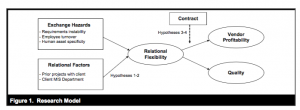Week 7_Gopal and Koka (2012)_Vicky Xu
The Asymmetric Benefits of Relational Flexibility: Evidence from Software Development Outsourcing
Gopal and Koka (2012) examined how and when relational governance, operationalized as flexibility, provides benefits to exchange partners in the presence of formal contracts. They provided a more nuanced understanding of the relationship between formal and relational governance by contending. Gopal and Koka (2012) presented the conceptual model as the following (Figure 1, p. 559):
Gopal and Koka (2012) tested the hypotheses on a dataset of 105 software development outsourcing projects completed by an Indian software vendor. And they used a multi-pronged analytic strategy to test the hypotheses. The relational flexibility model included OLS, nonlinear 3SLS, and treatment effects. The Profitability and quality models include the interaction model, 3SLS, 2SLS, the non-interacted 2SLS, and the treatment effects.
Gopal and Koka (2012) found strong support for the hypotheses of asymmetric benefits from relational flexibility to different contracting parties in an outsourcing relationship. The findings in this paper highlight the need to establish risk exposure first, and then examine the effects of flexibility on performance contingent on risk exposure. And the findings also highlight the implications of relational governance for the performance dimensions of interest. The findings indicated that the need to incorporate a more nuanced, limited, and contingent view of relational governance and its benefits in extant theory, in contrast to the more expansive view of relational governance that predicts value for all partners to an exchange. What’s more, this paper also makes a methodological contribution.
However, this study has some limitations: (1). The data that from one vendor firm limits generalizability. (2). Dataset is small. (3). The measure of contract type is limited to the two extreme forms of contracts. (4). The measure of quality is perceptual and collected from the vendor. (5). The theoretical arguments used in this paper were based on the observed manifestation of relational governance in the specific exchange.



Leave a Reply
You must be logged in to post a comment.